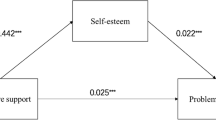Abstract
Objectives
To compare self-esteem and maternal attitude between children with learning disability and their unaffected siblings.
Methods
This cross sectional study was conducted at a tertiary care hospital in an urban setting. It comprised of 31 pairs of children with a learning disability, their unaffected siblings and input from their mothers. All children were assessed with Rosenberg self-esteem scale. Mothers were asked to fill Index of parental attitude (IPA) and semi structured proforma with demographic data and questionnaire about her children with a learning disability and his/her unaffected sibling.
Results
Self-esteem was found to be lower in children with learning disability. They felt they do not have much to be proud of and have a fewer number of good qualities. They are also inclined to consider themselves as failures. In factors affecting self-esteem, index of parental attitude was found to be unfavorable towards children with learning disability. Mothers felt child was interfering with their activities and was getting on their nerves. In addition, they also felt that they do not understand their child, feel like they do not love their child and wished that child was more like others they know off. More academic failures, academic difficulties and negative school report were also perceived by mother as lowering child’s self-esteem.
Conclusions
Self-esteem was lower in children with learning disability. In factors affecting self-esteem maternal attitude, academic difficulties, academic failure and negative school reports was found to be unfavorable.
Similar content being viewed by others
References
Aminoff M, Daroff R. Encyclopedia of the neurological sciences. Boston (MA): Academic; 2003. pp. 765–9.
American Psychiatry Association. Diagnostic and statistical manual of mental disorders. 4th ed. Washington, DC: American Psychiatry Association; 1994.
Chandra R, Srinivasan S, Chandrasekaran R, Mahadevan S. The prevalence of mental disorders in school-age children attending a general paediatric department in southern India. Acta Psychiatr Scand. 1993;87:192–6.
Hunt RD, Cohen DJ. Psychiatric aspects of learning difficulties. PediatrClin North Am. 1984;31:471–97.
Schachter DC, Pless IB, Bruck M. The prevalence and correlates of behaviour problems in learning disabled children. Can J Psychiatry. 1991;36:323–31.
Saracoglu B, Minden H, Wilchesky M. The adjustment of students with learning disabilities to university and its relationship to self-esteem and self-efficacy. J Learn Disabil. 1989;22:590–2.
Valas H. Students with learning disabilities and low-achieving students- peer acceptance, loneliness, self-esteem, and depression. Soc Psychol Educ. 1999;3:173–92.
Brook U, Boaz M. Attention deficit and hyperactivity disorder (ADHD) and learning disabilities (LD): adolescent’s perspective. Patient Educ Couns. 2005;58:187–91.
Lundervold AJ, Posserud MB, Ullebø AK, Sørensen L, Gillberg C. Teacher reports of hypoactivity symptoms reflect slow cognitive processing speed in primary school children. Eur Child Adolesc Psychiatry. 2011;20:121–6.
Daniel SS, Walsh AK, Goldston DB, Arnold EM, Reboussin BA, Wood FB. Suicidality, school dropout, and reading problems among adolescents. J Learn Disabil. 2006;39:507–14.
Shaywitz SE. Dyslexia. N Engl J Med. 1998;338:307–12.
Karande S, Kulkarni M. Poor school performance. Indian J Pediatr. 2005;72:961–7.
Gecas V, Schwalbe ML. Parental behavior and adolescent self-esteem. J Marriage Fam. 1986;48:37–46.
Mann M, Hosman CM, Schaalma HP, de Vries NK. Self-esteem in a broad-spectrum approach for mental health promotion. Health Educ Res. 2004;19:357–72.
Bosacki S, Dane A, Marini Z, Cura YLC. Peer relationships and internalizing problems in adolescents: mediating role of self–esteem. Emotional and Behavioural Difficulties. 2007;12:261–82. doi:10.1080/13632750701664293.
Neumark-Sztainer DR, Wall MM, Haines JI, Story MT, Sherwood NE, van den Berg PA. Shared risk and protective factors for overweight and disordered eating in adolescents. Am J Prev Med. 2007;33:359–69.
Strauss RS. Childhood obesity and self-esteem. Pediatrics. 2000;105:e15.
Tippett JS, Silber E. Self-image stability: the problem of validation. Psychol Rep. 1965;17:323–9.
Hudson H. WALMYR assessment scales scoring manual. Tempe, AZ: WALMYR; 1996.
Trumpeter NN, Watson PJ, O’Leary BJ, Weathington BL. Self-functioning and perceived parenting: relations of parental empathy and love inconsistency with narcissism, depression, and self-esteem. J Genet Psychol. 2008;169:51–71.
Felson B, Zeilinski MA. Children’s self-esteem and parental support. J Marriage Fam. 1989;51:727–35.
Falik LH. Family patterns of reaction to a child with a learning disability: a meditational perspective. J Learn Disabil. 1995;28:335–41.
Karande S, Kuril S. Impact of parenting practices on parent–child relationships in children with specific learning disability. J Postgrad Med. 2011;57:20–30.
Acknowledgments
The authors thank Dr. Ravindra Rananavare, Dean of Topiwala National Medical College and B. Y. L. Nair charitable hospital for granting permission to publish the paper using hospital data.
Contributions
The LS and VN designed the study, interpreted data and results, performed literature review and drafted the manuscript. LS and VN collected the data and SH and KR supervised data recording and interpretation.
Conflict of Interest
The paper was selected and presented in Luke Clerk award category atIACAMON – 2011(XIth biennial Conference Indian Association for Child & Adolescent Mental Health).
Role of Funding Source
None
Author information
Authors and Affiliations
Corresponding author
Rights and permissions
About this article
Cite this article
Lahane, S., Shah, H., Nagarale, V. et al. Comparison of Self-Esteem and Maternal Attitude Between Children with Learning Disability and Unaffected Siblings. Indian J Pediatr 80, 745–749 (2013). https://doi.org/10.1007/s12098-012-0915-5
Received:
Accepted:
Published:
Issue Date:
DOI: https://doi.org/10.1007/s12098-012-0915-5




